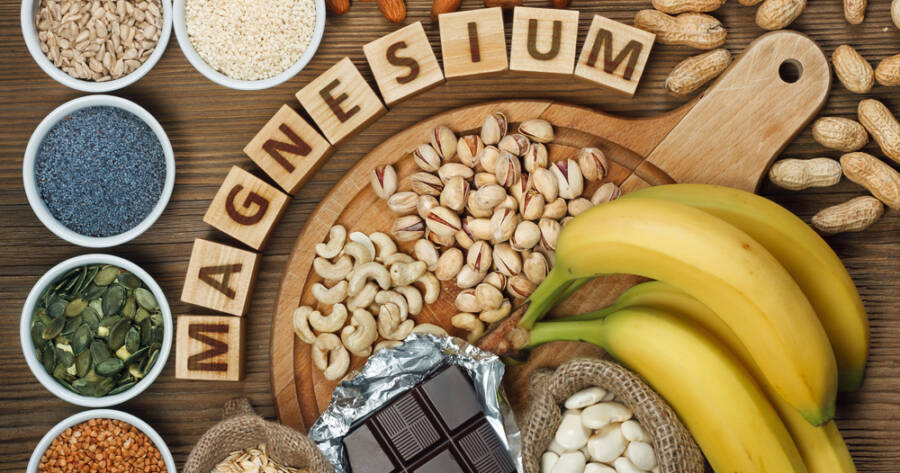Magnesium, a vital nutrient, is found in many foods. It’s essential for health, sleep, and energy. But which foods are high in magnesium? Knowing that can help you boost your intake.
Magnesium deficiency can lead to a range of health issues, underscoring the importance of this nutrient in your diet. By understanding the various sources and benefits of magnesium, you can make informed choices to maintain optimal health.
What Is Magnesium?
Magnesium is a mineral that plays a crucial role in over 300 bodily functions.1 It’s involved in energy production, protein synthesis, muscle and nerve function, and the regulation of blood pressure. This essential nutrient also contributes to the formation of strong bones and teeth.
Why Is Magnesium Important?
Magnesium is essential for maintaining overall health and well-being. It supports a healthy immune system, helps regulate blood sugar levels, and promotes proper muscle and nerve function. Adequate magnesium intake has been linked to a reduced risk of chronic diseases such as heart disease, type 2 diabetes, and osteoporosis.
Foods That Have Magnesium
There are many foods that are rich in magnesium, making it easy to incorporate this essential nutrient into your diet.2 Here are some examples:
Leafy Green Vegetables: Spinach, kale, and Swiss chard are excellent sources of magnesium. These greens are not only packed with this essential nutrient but also provide other vitamins and minerals that are beneficial for your health.
Nuts and Seeds: Almonds, cashews, and pumpkin seeds are foods that are high in magnesium. They make for a convenient and nutritious snack, providing you with a good dose of this essential mineral.
Whole Grains: Whole grains like brown rice, quinoa, and oats are not only rich in fiber but also contain magnesium. Incorporating these grains into your meals can help boost your magnesium intake.
Legumes: Beans, lentils, and chickpeas are not only a great source of plant-based protein but also contain magnesium. Adding legumes to your diet can provide you with a variety of essential nutrients, including magnesium.
Avocados: Avocados are not only delicious but also a good source of magnesium. They are also rich in healthy fats, fiber, and other essential nutrients.
Dark Chocolate: Good news for chocolate lovers! Dark chocolate contains magnesium, along with antioxidants that can benefit your health. Just make sure to choose dark chocolate with a high cocoa content to maximize the magnesium content.
Fish: Some types of fish, such as salmon and mackerel, are not only rich in omega-3 fatty acids but also contain magnesium. Including fish in your diet can provide you with a variety of essential nutrients.
Bananas: Bananas are not only a convenient and portable snack but also a good source of magnesium. They are also rich in potassium, which is important for maintaining proper muscle and nerve function.
Incorporating Adequate Magnesium in Your Diet
Incorporating magnesium into your diet need not be a complex task. Opt for diverse, magnesium-rich foods daily to ensure sufficient intake. Start by including a serving of leafy greens or a handful of nuts as part of your meals or snacks. Cooking with whole grains and legumes can also boost your magnesium levels. Remember, it’s about balance and variety; incorporating different magnesium-rich foods throughout the week can easily meet your dietary needs without relying on supplements.
Understanding Magnesium Supplements
While a balanced diet is the best way to obtain magnesium, supplements can be beneficial in certain situations. They are particularly useful for individuals with magnesium deficiencies or those with dietary restrictions that limit the intake of magnesium-rich foods. However, it’s crucial to consult a healthcare professional before starting supplements, as they can interact with medications and may not be suitable for everyone. Supplements come in various forms, like magnesium citrate, oxide, and chloride, each with different absorption rates and uses.
The Benefits of Sufficient Magnesium
Ensuring adequate magnesium intake is essential for holistic health. Magnesium aids in muscle and nerve function, blood sugar control, and blood pressure regulation. It also supports bone health, reduces the risk of osteoporosis, and plays a role in combating inflammation. On a broader scale, adequate magnesium levels can enhance physical performance, improve sleep quality, and boost mood. By simply incorporating more magnesium-rich foods into your diet, you can enjoy these wide-ranging health benefits.
Why You Should Learn More About Magnesium
Magnesium is an essential nutrient that plays a crucial role in maintaining overall health and well-being. Incorporating magnesium-rich foods into your diet can help ensure that you are getting an adequate intake of this vital mineral. Boost your health, improve sleep, and increase energy levels by including foods such as leafy green vegetables, nuts and seeds, whole grains, legumes, avocados, dark chocolate, fish, and bananas in your meals. Start searching online today to learn more about the benefits of magnesium and discover delicious recipes that incorporate these magnesium-rich foods.
